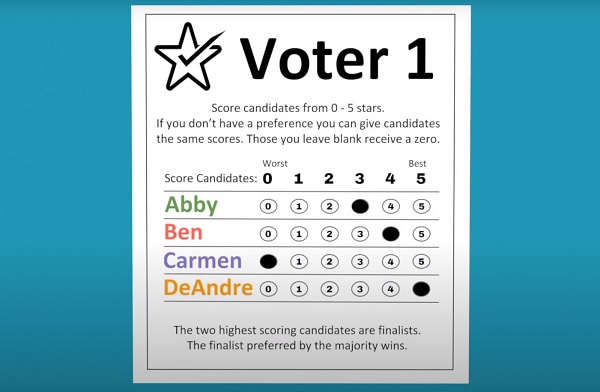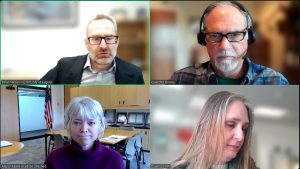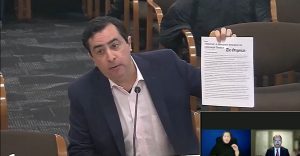With STAR voting on the May 2024 ballot, council considers its options
6 min read
Eugene City Council hears that STAR voting will be on the ballot in May.
City Recorder Katie LaSala: Initiative Petition 2023-2 is a charter amendment that would change the method for electing mayor and city councilors.
[00:00:13] One of the options for council is to put forward an alternative measure (or measures) to be voted on at the same election as the referred measure. That’s the only thing that has a timeline and council would have to refer the measure by Feb. 21 of next year.
[00:00:31] You have the option to vote to urge adoption or defeat of the referred measure. And this is really a statement to the electorate allowing you to tell the electorate how you wish they would vote.
[00:00:43] John Q: The STAR in STAR voting stands for: Score Then Automatic Runoff. Voters rate candidates as they’d rate a restaurant or an online purchase, from zero stars for terrible, to five stars for superlative. We add up all the stars for each candidate, and the two candidates with the most total stars are the finalists. Once we know the finalists, we look again at each ballot: Which finalist got more stars on that ballot? That vote goes to that finalist.
[00:01:09] It’s like having both a primary election to narrow the field and a final election to choose the winner on the same ballot.
[00:01:18] Councilor Mike Clark: I’ve actually spent quite a lot of time with the folks who have been presenting this option for a long time for a number of years now. I’m not in favor. It’s an interesting analysis to go through why they think it will be so much better, why they think it will lead to more moderate candidates rather than more extreme candidates, as well as a number of other benefits they talk about.
[00:01:43] The biggest part that concerns me is one election where everything’s on one roll of the dice, as it were, has everyone analyzing for the number of stars they would give any particular candidate—five stars for this one and four stars for that one, three for the other one, whatever, based on how well you like any particular candidate.
[00:02:04] I think that the reality is we’ll end up with maybe one of the most negative elections we’ve ever seen, because it’s much easier to make somebody not like somebody than it is to make somebody like somebody.
[00:02:17] And I think we’ll end up with some extremely negative campaigning. And I would really hate to see that happen.
[00:02:25] I’d be happy to be talked out of that if Mr. (Mark) Frohnmayer or anybody else that’s pushed this for a very long time, who wants to tell me why I’m wrong. I’d love to hear about it. But my real concern is about the system.
[00:02:38] Councilor Matt Keating: I did not sign this petition, though I was asked multiple times to do so. Because while I long for creative ways to expand the electorate and increase participation in elections, it’s my understanding that this proposal will not only change the method of how we vote, but the timeline.
[00:02:58] If we as a society want to encourage taking money out of politics, putting everyone who wants to run automatically in the general election is the opposite of what’s in front of us.
[00:03:13] In a state in which we have the highest voter turnout in the nation, I wonder what we’re trying to do with this arguably confusing approach that doesn’t take money out of politics and it hasn’t necessarily been tried and tested that indicates that it increases the electorate. It creates more confusion, arguably…
[00:03:40] I remember a similar measure being in front of (Lane) County voters in recent history and county voters wisely saying, ‘Put on the brakes. I’m confused.’ And county voters turned it down. It didn’t work at the county level, I don’t think it’s going to work at the city level.
[00:03:55] And so I wish that our school boards or community college boards were the laboratories for our small-d democratic experiments rather than the city council.
[00:04:11] John Q: The Lane County vote was confirmed by City Attorney Kathryn Brotherton.
[00:04:15] City Attorney Kathryn Brotherton: In the 2018 general election, the charter amendment to adopt Score Then Automatic Runoff (STAR) voting for elections was a Lane County measure that had 75,807 ‘Yes’ votes, 83,450 ‘No’ votes.
[00:04:36] Councilor Alan Zelenka: Yeah, I’m not a fan of STAR voting. I think it’s a solution looking for a problem and it’s very confusing. It’s shown to be confusing in other places has not worked well, where similar types of things have been used.
[00:04:50] Creating multiple ballots in our jurisdiction just adds to that confusion. Even within the city, EWEB and council and mayor are going to be completely different types of processes. It eliminates the May primary, which I think is a bad idea. I don’t intend to support this.
[00:05:10] Councilor Lyndsie Leech: Well, as someone currently in a runoff, it feels like it would be nice to not have to do a runoff… But the runoff is actually a nice time to really solidify what you stand for, what value you bring, and really be talking to voters over a long term to make sure that you’re representing the city and your ward.
[00:05:29] I think a lot of those complexities that everyone’s talking about are certainly a barrier for me to get to a place where I would support it. I think having two separate ballots, having two separate systems for people to learn— I think the only way forward is for the whole county to do this together and I don’t really see that happening before our next election.
[00:05:55] So, it would take a lot for me to get to the other side of that.
[00:06:00] Councilor Emily Semple: I have concerns really about the negative campaigning. It’s so unnecessary. And when I was campaigning, I refused to go negative. It’s always better to talk about how great you are rather than any detrimental things to your opponents. (And don’t call them by name. They’re always ‘the opponent,’ because it’s name recognition. Just a little tip.)
[00:06:25] If we could start later, that would eliminate some of the financial concerns. I realize if you have five people running, they all have to spend their money up until November, rather than till May, but it’s a gruelingly long experience.
[00:06:42] I would be much more amenable to it if the county was doing it, also the state, which seems unlikely. It would eliminate some of the confusion and education needed.
[00:06:54] So I’m finding it’s intriguing, but I’m not wanting to pursue it at this time. I’m ready for the community to think about what they want to do. And if we do get an opinion, we do have until February to say whether or not we’d like it.
[00:07:12] Councilor Greg Evans: From some of the things that I’ve read recently about this and what has happened in other places in the country, it has discouraged voters from voting and has had an impact particularly on underrepresented, underserved voters and their perception about the ballot being accessible to them.
[00:07:36] So I think that we need to be very careful about what we do here and how we look to ‘either change or improve our voting system,’ because the old adage: ‘If it’s not broke, we don’t need to fix it.’
[00:07:56] Councilor Jennifer Yeh: I will just say that I am in favor of doing nothing at this time. I’m not against having more conversations about it, but I’m not sure I’m interested in putting out an opinion. I feel like people are smart enough that they can figure out whether they think this is a good idea or not on their own.
[00:08:14] Councilor Randy Groves: My biggest concern is, I think we’re just going to add a level of confusion to voting and to me, it seems like if there’s a move in this direction, it should be a whole area or not at all. But that’s my opinion.
[00:08:30] The petitioners have done a great job in collecting more than the necessary signatures. And I do trust the voting public to be able to look at things and come up with reasonable conclusions. I think we have a pretty well-informed electorate here in our community, and we’re fortunate for having that and I do have confidence in the voting public.
[00:08:52] John Q: The council will hold another work session. They can recommend a ‘Yes’ or ‘No’ vote, put forward their own proposal, or remain silent and leave it up to Eugene voters. Whatever the council does, STAR voting will be on the ballot in May 2024.






